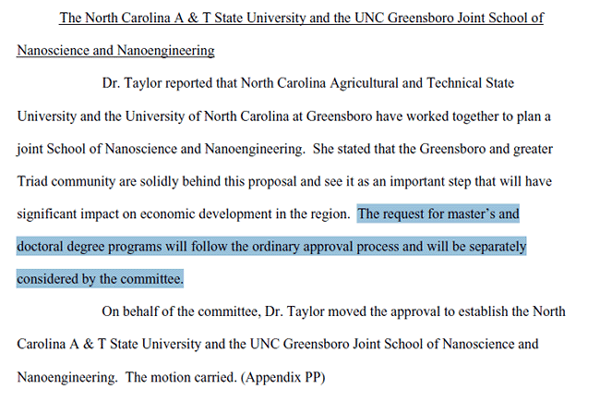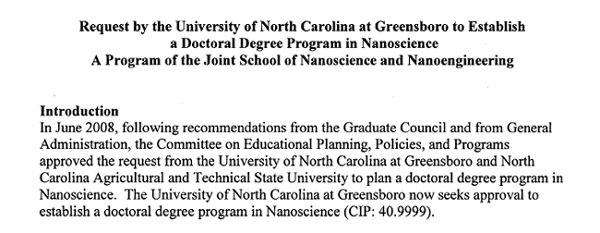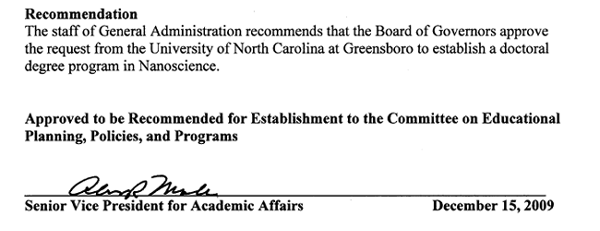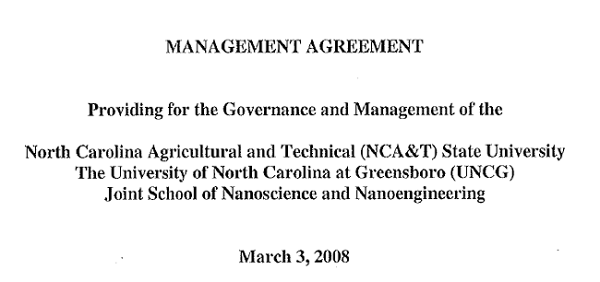 Throw
in with the devil get thrown in with the devil Throw
in with the devil get thrown in with the devil
Historically
THE CREATOR steps
out of background into foreground on behalf of enslaved people in
the most powerful country at the time: African
& Native American Lives Matter!! ... "All North Carolina
Agricultural and Technical State University has is a few degrees and
a little farmland and they want to take that - defeat their
plan." "Jesus"
- Michael J. Pippen since 1949 - Wingman
Archangel Gabriel |
| Michael J. Pippen 12.30.20 updated 12.31.20 |
|
Banality of Evil -- Conceived in bigotry and
nourished on the twin fronts of prejudice and injustice,
the Joint School of Nanoscience and Nanoengineering
located on UNC Board of Governors bogus NCGS:
116-198.34. (8b) NCA&T/UNCG
Joint Millennial Campus, UNC at Greensboro affiliate,
Gateway University Research Park, - in Greensboro, NC. When
all of the occupations which will be affected by
nanotechnology will require a BS in engineering with a
broad, interdisciplinary and multi-disciplinary
approach; will require an understanding not only of
electrical, mechanical and civil engineering, but
biology, physics and chemistry as well. Why is liberal
Arts UNC Greensboro in the Nanoscience picture, except
for unvarnished racism. |
|
“The Joint School for Nanoscience and Nanoengineering...built on the major nanotechnology research activity that
had been established at nearby Wake Forest and at NC
A&T [1] |
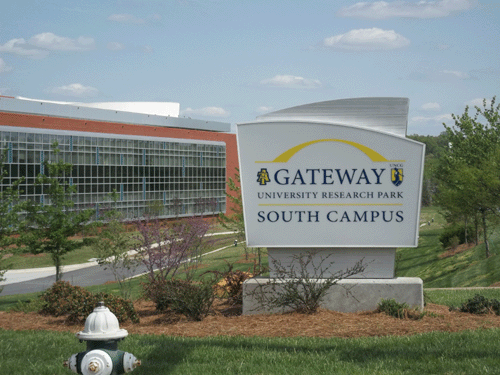 “It
[JSNN] will be one of the most stimulating opportunities
in the history of the area and will serve as a national
model for collaboration between two institutions, one a
historical black institution and the other a historical
white female institution.” [3] The
Joint School of Nanoscience and Nanoengineering will be
a unique, interdisciplinary school, located at the South
Campus of the Gateway University Research Park, the
joint millennial campus of NC A&T and UNCG'
[3]...“The building would include
the academic departments, laboratory facilities
(teaching and research), and centers and institutes of
the new School as well as selected centers and
institutes currently located at the partner
universities. [3]Emphasis added “It
[JSNN] will be one of the most stimulating opportunities
in the history of the area and will serve as a national
model for collaboration between two institutions, one a
historical black institution and the other a historical
white female institution.” [3] The
Joint School of Nanoscience and Nanoengineering will be
a unique, interdisciplinary school, located at the South
Campus of the Gateway University Research Park, the
joint millennial campus of NC A&T and UNCG'
[3]...“The building would include
the academic departments, laboratory facilities
(teaching and research), and centers and institutes of
the new School as well as selected centers and
institutes currently located at the partner
universities. [3]Emphasis added |
|
Alleged
in the Media: Its
[UNCG] historically strong programs in music, education
and nursing are not the kinds of programs that spin off
research and development or software companies to fuel
high tech economies". [7] "UNCG
....hoped
to get several doctoral level programs out of a joint
engineering and science research center with A&T"; [2]
“Activities/Resources: Leverage faculty collaboration at
JSNN to enhance research partnerships between UNCG and
NC A&T researchers. Expected Result, UNCG opportunities
in grants previously unavailable due to limitations in
areas of certain research expertise. “ |
| |
|
Fraudulent claiming HBCU NC A&T and HWI UNCG
were partners in NCGS:
116-198.34. (8b) NC
A&T/UNCG Joint
Millennial Campus. |
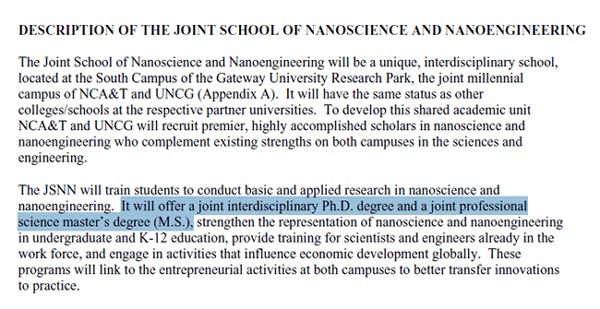 |
|
May 2007 UNC Board of Governors established
alleged Joint School of Nanoscience and
Nanoengineering, at bogus NC A&T / UNCG
Joint Millennial Campus, UNCG affiliate,
Gateway University Research Park, Inc.; to
offer (a) joint interdisciplinary Ph.D.
degree and (a) joint professional science
master's degree, unambiguous duplications. |
|
|
|
United States v. Fordice, 505
U.S. 717 (1992) a United States
Supreme Court case that resulted in an eight
to one ruling that the eight public
universities in Mississippi had not
sufficiently integrated and that the state
must take affirmative action to change this
under the Equal Protection Clause and Title
VI. This is not
a legal setting but context comparison UNC
BOG & SOCS policies in light of the selected
text held in UNITED STATES v. FORDICE,
GOVERNOR OF MISSISSIPPI :
|
|
..If the State perpetuates policies and
practices traceable to its prior de jure
dual system that continue to have
segregative effects ...implicit in the
court’s finding of “unnecessary” duplication
is the absence of any educational
justification ....and such policies are
without sound educational justification and
can be practicably eliminated, implicated
the Equal Protection clause... , emphasis
added. |
| |
The National Center for
Educational Statistics (NCES) responsible for collecting
and presenting statistical data and information for the
nation; classifies Nanoscience and Nanoengineering as
Nanotechnology CIP 15.1601: Engineering technologies and
Engineering related fields.
|
 |
|
PCG/UNC-NCCCS/UNC Interim report
3.doc/RB.SP.PC.CR.ATPCC.1/CC.14/10May05 |
|
|
 |
|
University of North Carolina at Greensboro
2007-2008 Profile |
|
Historical
black North Carolina A&T, as one of the
state's two land grant institutions, has
programs through the doctoral level. Its
programs include engineering, arts and
sciences, agricultural and environmental
sciences, business and economics, education,
nursing, technology, and graduates studies.
“The expected roles of a land-grant
institution, is teaching agriculture and
engineering, and providing cooperative
extension services” . |
| |
 |
|
For Liberal Arts UNC Greensboro with doctorial programs
in music and nursing to offer Nanoscience degrees
requires access to NC A&T academic programs and
research: “Although the degree is in Nanoscience (does
not include Nanoengineering),

students will be given the opportunity to take relevant
courses at the School of
Engineering at North Carolina A&T University and must be
able to work on collaborative projects with faculty in
the School of Engineering.
|
|
|
 |
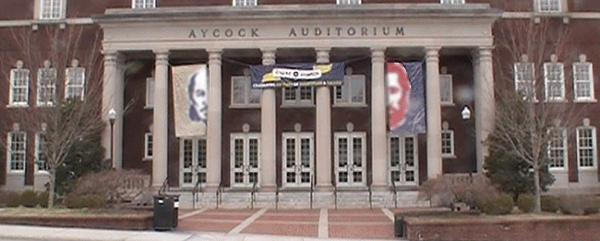 |
|
North Carolina, like other Southern states,
relied on slavery to build its economy during
the 18th and 19th centuries. Slaves across the
state raised crops, did domestic chores,
constructed new buildings, sailed ships, and
performed countless other jobs, all for no
pay." The
Story of Slavery in North Carolina |
|
|
|
|
UNC Greensboro white
Privilege Nanoscience degrees |
|
|
|
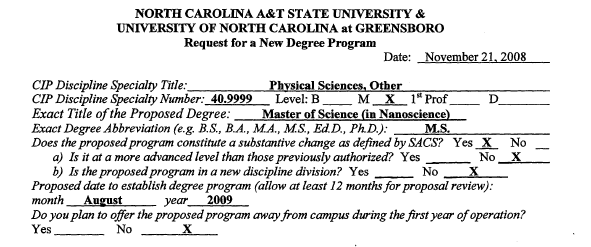 |
|
NC A&T/UNCG
submitted Joint Request for authorization to
Establish” Ph.D. in Nanoscience” dated Oct.
10, 2008 to UNC General Administration and
Joint Request for authorization to establish
“Master of Science (in Nanoscience)” dated
Nov. 21, 2008 to UNC General
Administration. |
|
|
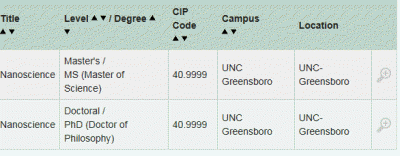 The
University of North Carolina Board of Governors authorized HWI UNC Greensboro Nanoscience MS
and Gateway University Research Park, Inc. on
November 13, 2009 and PhD program in Nanoscience on
January 8, 2010 to UNCG. Requiring UNCG students take relevant
courses at the School of Engineering at North Carolina
A&T University and be able to work on collaborative
projects with faculty in the School of Engineering”.
Excluding
(The) North Carolina Agricultural and Technical State
university from offering MS and PhD Nanoscience
degrees, forcing the HBCU out of the JSNN Mission to
offer (a)
joint interdisciplinary Ph.D. degree and (a) joint
professional science master's degree. And depriving NC
A&T benefit Nanoscience funding. The
University of North Carolina Board of Governors authorized HWI UNC Greensboro Nanoscience MS
and Gateway University Research Park, Inc. on
November 13, 2009 and PhD program in Nanoscience on
January 8, 2010 to UNCG. Requiring UNCG students take relevant
courses at the School of Engineering at North Carolina
A&T University and be able to work on collaborative
projects with faculty in the School of Engineering”.
Excluding
(The) North Carolina Agricultural and Technical State
university from offering MS and PhD Nanoscience
degrees, forcing the HBCU out of the JSNN Mission to
offer (a)
joint interdisciplinary Ph.D. degree and (a) joint
professional science master's degree. And depriving NC
A&T benefit Nanoscience funding. |
|
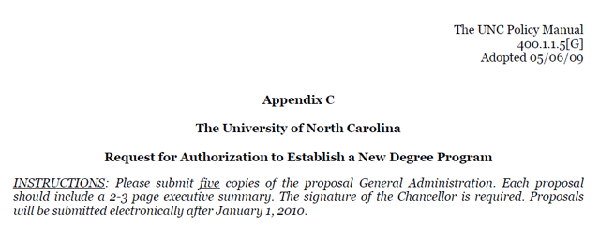 |
|
Chancellor signature certifies proposal [UNC Policy
Manual 400.1.5(G)] to establish new degree program was
reviewed and approved by the appropriate campus
committees and authorities. |
| |
|
Response to Public records request to Dr. David H.
Perrin UNCG Provost & Executive Vice Chancellor,1/7/11,
for a copy of an UNCG chancellor signed request to
establish stand alone Masters and PhD Nanoscience
degrees at UNCG, Counsel Steve Serck responded "In
response to your request of 1/7/11, no such documents as
you described exists." |
| |
|
Unambiguous
lack of UNCG Chancellor
Dr. Linda Brady signed Proposals requesting to
establish Nanoscience Professional Master of Science in
Nanoscience and Ph.D. Nanoscience clearly demonstrated
UNCG had not expressed intentions to establish
the degrees, they had not been approved by the faculty
and administration, and were not pursuant UNC Policies 400.1.1,1[G]and
400.1.1.5[G], and did not officially originate from UNC
Greensboro. |
| |
|
Requests to UNC-GA for a UNCG Request to
Plan a PhD and Request to Establish a
standalone PhD in Nanoscience proscribed by
UNC Guidelines for Academic Program
Development subsection (B) related to
degree authorization Ms. Joni Worthington
(UNC-GA) Vice President for Communications
UNC General Administration responded to a
public record request for a UNCG Chancellor
signed request to plan and establish a PhD
in Nanoscience said: “Dr. Alan Mabe in
his capacity as Senior Vice President for
Academic Affairs determined:
· UNCG
was not required to submit a new request to
plan a Ph.D. in Nanoscience. The joint
proposal submitted by UNCG and NCA&T was
deemed sufficient for the campus to move
forward with planning a stand-alone degree
program.
· UNCG
was not required to submit a new request to
establish a Ph.D. in Nanoscience. The joint
request submitted by UNCG and NCA&T, which
had already been recommended for approval by
the UNC Graduate Council, was deemed
sufficient for Board consideration. The
Board of Governors
concurred with that determination in
approving the establishment of the program.
(E-mail 10.08. 2010) “ |
| |
|
Stealing
NC A&T Praise
|
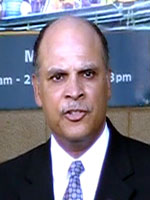 Ask
(then )UNC President
Erskine Bowles, Dr.
Alan Mabe, Dr. Alton
Thompson, Dr. David
H. Perrin, Dr. James
Ryan and NC A&T
Chancellor Harold
Martin where are NC
A&T Nanoscience
degrees? Ask
(then )UNC President
Erskine Bowles, Dr.
Alan Mabe, Dr. Alton
Thompson, Dr. David
H. Perrin, Dr. James
Ryan and NC A&T
Chancellor Harold
Martin where are NC
A&T Nanoscience
degrees? |
| |
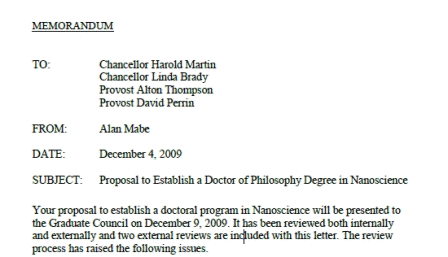 |
Dr. James
Sadler
Associate
Vice
President
for Academic
Planning
University
of North
Carolina :
December 9,
2009
UNC Graduate
Council
recommends
authorization
of the joint
PhD. |
|
|
|
Clearly UNC Board
of Governors and UNC
General
Administration
exploited HBCU
constituent
NC
A&T
Engineering circular
and research to
establish
Nanoscience MS and
Ph.D. at cross-town
white constituent UNC
Greensboro and UNCG
affiliate Gateway University Research Park,
Inc. . |
|
|
|
“A Promise for the Future by
some accounts, nanotechnology is destined to replace
much of today's technology. Gateway University Research
Park expects to be at the forefront of these new
technologies with the creation of a new institution,
The Joint School for Nanoscience and Nanoengineering
(JSNN). ” emphasis added [8] |
|
In addition to degree programs in Nanoscience and
Nanoengineering, JSNN will engage in research and
outreach, as well as the expected roles of a
land-grant institution, such as teaching agriculture and
engineering, and providing cooperative extension
services. The JSNN facilities will be located on
land that was formerly part of the NC A&T farm. |
|
|
Nanotechnology/Nanoscience/Nanoengineering
should have been HBCU NC A&T Signature
Programs |
| |
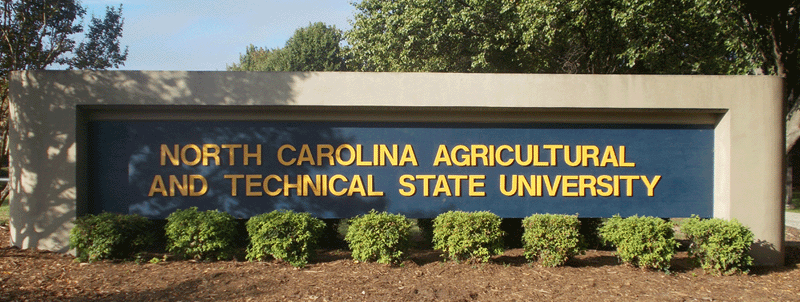 |
| |
|
Historical black North Carolina
A&T, as one of the state's two
land grant institutions, has
programs through the doctoral
level. Its programs include
engineering, arts and sciences,
agricultural and environmental
sciences, business and
economics, education, nursing,
technology, and graduates
studies. “The expected roles of
a land-grant institution, is
teaching agriculture and
engineering, and providing
cooperative extension services”
. |
| |
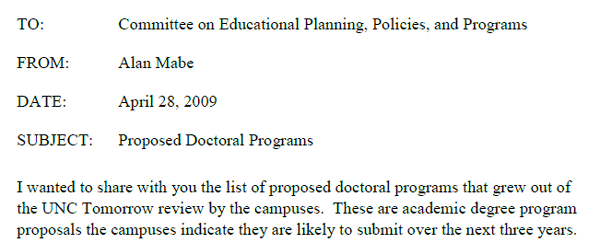 |
 |
| Dr. Alan Mabe
Memorandum to Ed
Planning, Ph.D. dated
April 28, 2009, degree
proposal alleged grew
out of UNC Tomorrow
review by the campuses
indicate NC A&T
proposed Nanoscience and Material
Science
(Nanoengineering)
degrees. |
|
| |
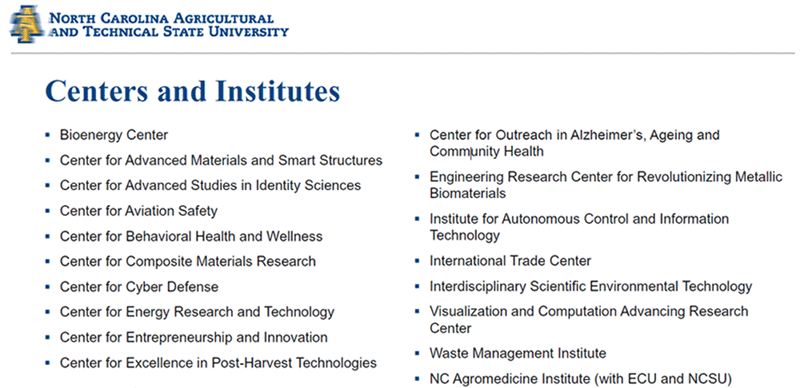 |
|
| |
|
In 2003-04, with the backbone
of North Carolina's industrial
economy Tobacco, Textiles, and
Furniture outsourced, in
decline/recession or outsourced
with appropriations for
UNC-System taking an ever
increasing multi-billion dollar
bite out of state's coffers,
North Carolina's Legislature
thru House Bill 1264 (HB 1264)
direct UNC-BOG and COMMUNITY
COLLEGE SYSTEM to contract a
private consulting firm that had
experience in higher education
to conduct a comprehensive
study (Staying
a step ahead) of the
mission and educational program
needs to ensure that the State's
citizens are academically
prepared and equipped for
current job opportunities and
jobs of the future in North
Carolina's growing knowledge
economy. |
| |
|
|
|
HB 1264 (6), says
with regard to the University System, there
shall be special emphasis on the development
of signature programs for Historically Black
Colleges and Universities and the University
of North Carolina at Pembroke.
|
|
“Signature programs” have been defined as
those that are distinctive, that build on
existing strengths,
that advance the institution’s profile, and
that serve regional and/or state economic
transformation needs." |
| |
|
“Expertise in nanotechnology may become a
prerequisite for many scientists and
engineers that support a wide variety of
industries, nano expertise among the North
Carolina science and engineering workforce
may soon become a competitive advantage
issue for the state. |
| |
|
It is predicted that nano scale science will
change the nature of almost every human-made
product this century. This field has great
potential applications in materials,
medicine, electronics, optics, data storage,
advanced manufacturing, environment, energy,
and national security. Some specific
applications include: lightweight new
materials with greatly improved strength and
wear characteristics; ultra-dense computer
memory; better drug design and better drug
and gene delivery; sensing applications for
agricultural, biological, chemical and
homeland security applications; improved
catalysts for the chemical and automotive
industries; new materials to improve fuel
economy and carbon dioxide emissions; and
improved batteries and energy efficient
processes for energy technologies. Nanoscale
materials already find use in numerous
pharmaceutical, catalytic, electronic,
magnetic, optoelectronic, biomedical,
cosmetic and energy applications." [
12] |
| |
|
"NC A&T has 12-years of experience
in Nanoscience and Nanotechnology”[9] |
| |
 NC
A&T is "well known in
areas such as advanced
materials, nanotechnology,,
computational science,
and says N.
Radhakrishnan, former VP
for research and
economic development at
N.C. A&T. The school
also has significant
strengths in other
areas, including
biotechnology, energy
and the environment,
information sciences and
technology, logistics
and transportation
development. NC
A&T is "well known in
areas such as advanced
materials, nanotechnology,,
computational science,
and says N.
Radhakrishnan, former VP
for research and
economic development at
N.C. A&T. The school
also has significant
strengths in other
areas, including
biotechnology, energy
and the environment,
information sciences and
technology, logistics
and transportation
development. |
 |
|
|
|
All these endeavors are
aligned in eight
research clusters that
bring faculty together
across disciplines to
develop large research
projects. These research
clusters run in parallel
with a number of
multidisciplinary
centers and institutes
at N.C. A&T, which
develop partnerships with
private and corporate
sponsors, educational
institutions, and
government agencies.
[10] |
|
|
| |
Nanotechnology is Experimental
NC A&T State University has been funded at an
average rate of $3-5 million per year in the
area of nanoscience and nanotechnology. Most
of the research in nanoengineering is done
in the Center for 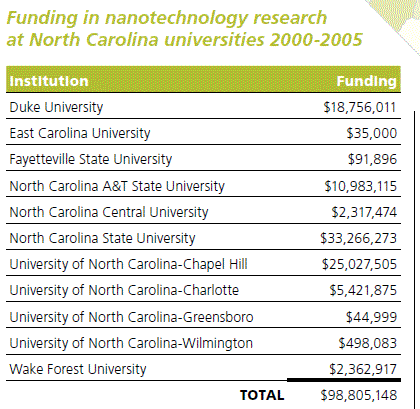 Advanced
Materials and Smart Structures (CAMSS).
Several Centers and projects are under CAMSS,
including the NSF Center for Research
Excellence in Science and Technology
(CREST), the DoD Center for Nanoscience,
Nanomaterials and Multifunctional Materials
(CNN) for Homeland Security, the NSF
Nanoscale Science and Engineering Center (NSEC),
the NSF project on US/Europe Materials
Collaboration: Self-Organized Nanostructured
Thin Films for Catalysis, the NSF project on
Nanoscale Interdisciplinary Research Teams (NIRT),
the NSF Major Research Instrumentation for
Nanoengineering Research, and the NSF
Nanotechnology Undergraduate Education (NUE)
program. CAMSS also facilitates many of the
materials research activities of the
NASA-National Institute for Aerospace (NIA).
In addition, Advanced
Materials and Smart Structures (CAMSS).
Several Centers and projects are under CAMSS,
including the NSF Center for Research
Excellence in Science and Technology
(CREST), the DoD Center for Nanoscience,
Nanomaterials and Multifunctional Materials
(CNN) for Homeland Security, the NSF
Nanoscale Science and Engineering Center (NSEC),
the NSF project on US/Europe Materials
Collaboration: Self-Organized Nanostructured
Thin Films for Catalysis, the NSF project on
Nanoscale Interdisciplinary Research Teams (NIRT),
the NSF Major Research Instrumentation for
Nanoengineering Research, and the NSF
Nanotechnology Undergraduate Education (NUE)
program. CAMSS also facilitates many of the
materials research activities of the
NASA-National Institute for Aerospace (NIA).
In addition, 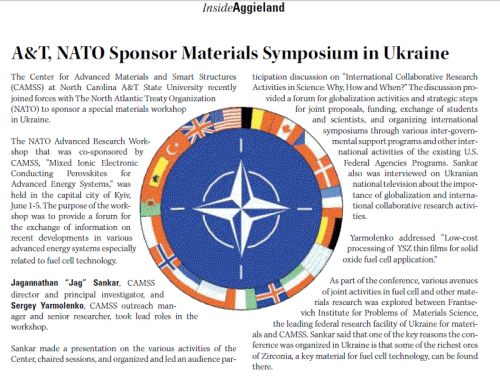 the
Center for Composite Materials Research (CCMR)
does research in nano-enhanced composite
materials and the Army Center of Excellence
for Battlefield Capability Enhancements
(Flexible Displays) does research in
material characterization and development of
novel displays. [3] the
Center for Composite Materials Research (CCMR)
does research in nano-enhanced composite
materials and the Army Center of Excellence
for Battlefield Capability Enhancements
(Flexible Displays) does research in
material characterization and development of
novel displays. [3]
NC A&T was 4th in Nanotechnology Research at
North Carolina Universities with $11 Million
Dollars between 2000-2005. In 2003 A&T, NATO
Sponsor Material Symposium in Ukraine. |
| |
|
Staying a Step Ahead (HB
1264(7)(2003-04)) the Legislature mandated
the Board of Governors emphasized existing
and new programs at Liberal Arts
Universities specifically aimed at meeting
business, industry, workforce, and career
needs of North Carolina in the State's
changing and growing knowledge-based
economy, taking into account, as
appropriate, State and regional economic
strategies. |
| |
 |
| |
|
UNC-G 2003-08 formulated a 2003-08 academic
plan to establish a joint Millennial campus
with NC A&T.
The [UNC-G] Associate Provost for Research
and Partnerships serves on the Government
Relations council for the Greensboro
Partnership and through this role
contributed to the lobbying efforts with the
state legislators for funding for the Joint
School of Nanoscience and Nanoengineering. The
College [College of Arts and Sciences] was a
central player in the continuing work to
establish the Joint School of Nanoscience
and Nanoengineering with NC A&T University.
Degrees or programs being considered for the
future· MS in Nanoscience and Ph.D. in
Nanoscience. [UNC-G Curricular Planning,
Academic Affairs Annual Report AY 2007/08] |
|
|
UNC System Scripting constituent HBCU North Carolina A&T State University
Out of Nanoscience and constituent HWI UNC Greensboro & Gateway
University Research Park In via Joint School of
Nanoscience and Nanoengineering. |
|
"The goal isn't to expand mankind's body
of knowledge so much as it is to expand
the local economy." [11] |
| |
|
 |
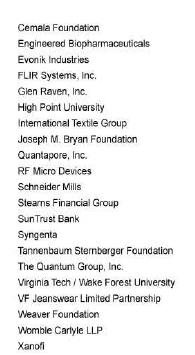 |
|
Rewinding
to
1991-92, at
bequest
of UNC
Board of
Governors
NC Legislature
enacted
NC GA §
116‑252.
Piedmont
Triad
Graduate Engineering
Program
in
support
faculty
and
graduate
students involved
in
engineering
at the
campuses
of The
University
of North
Carolina.
In doing
so UNC
Board of
Governors
rejected
a $20
Million dollar
NCA&T/UNC-G Engineering
and
Science
Research
Center. |
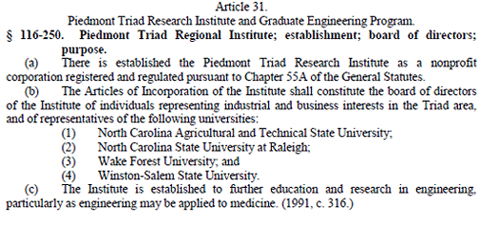 |
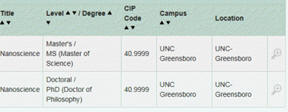 |
|
|
|
|
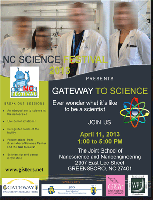 Reported
in the Media: "UNCG/A&T
proposal had won the
enthusiastic endorsement of
top Reported
in the Media: "UNCG/A&T
proposal had won the
enthusiastic endorsement of
top  Greensboro
business leaders. Acting
through the Greensboro
Development Corp., they last
year commissioned a $300,000
study to determine what
areas of research at
UNCG/A&T center could
engage in to the benefit
of the Triad economy and
its industries"; and
I'm Greensboro
business leaders. Acting
through the Greensboro
Development Corp., they last
year commissioned a $300,000
study to determine what
areas of research at
UNCG/A&T center could
engage in to the benefit
of the Triad economy and
its industries"; and
I'm  [banker
E.S. ``Jim'' Melvin,
chairman of the Greensboro
Development Corp convinced
it [Research Center] is the
thing to do, but we've got
to work through the
university system, build the
case for it and get it high
on the board's priority
list. That's going to take
some time.'' reported Jack
Scism TRIAD
SCIENTIFIC RESEARCH CENTER:
VIABLE DREAM OR PIE IN THE
SKY? , JACK SCISM,
Greensboro News & Record -
Monday, July 20, 1992 .
(emphasis added) [banker
E.S. ``Jim'' Melvin,
chairman of the Greensboro
Development Corp convinced
it [Research Center] is the
thing to do, but we've got
to work through the
university system, build the
case for it and get it high
on the board's priority
list. That's going to take
some time.'' reported Jack
Scism TRIAD
SCIENTIFIC RESEARCH CENTER:
VIABLE DREAM OR PIE IN THE
SKY? , JACK SCISM,
Greensboro News & Record -
Monday, July 20, 1992 .
(emphasis added) |
|
|
| |
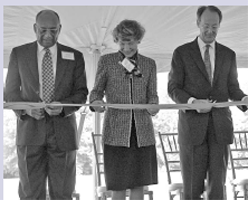 "
I am so energized by the potential of this research
park,
in particular the joint schools of nano
technology and nano science. The world is
seeing explosive growth today in the
commercialization of nanotechnology. We will
have all of the assets
right here in Guilford County that
we need to participate in that explosion,
and they will be right here at the Gateway
University Research Park."
said Erskine president of the University of
North Carolina system. "
I am so energized by the potential of this research
park,
in particular the joint schools of nano
technology and nano science. The world is
seeing explosive growth today in the
commercialization of nanotechnology. We will
have all of the assets
right here in Guilford County that
we need to participate in that explosion,
and they will be right here at the Gateway
University Research Park."
said Erskine president of the University of
North Carolina system. |
|
| |
 Bowles
appointee Interim NC A&T
Chancellor Lloyd V. Hackley
and UNCG Chancellor made the
Request to Establish The
JSNN March 7, 2007. Bowles
appointee Interim NC A&T
Chancellor Lloyd V. Hackley
and UNCG Chancellor made the
Request to Establish The
JSNN March 7, 2007. |
|
|
|
|
Reported in the Media: Its
[UNCG] historically strong programs in music, education
and nursing are not the kinds of programs that spin off
research and development or software companies to fuel
high tech economies". [7] "UNCG
....hoped
to get several doctoral level programs out of a joint
engineering and science research center with A&T"; [2]
“Activities/Resources: Leverage faculty collaboration at
JSNN to enhance research partnerships between UNCG and
NC A&T researchers. Expected Result, UNCG opportunities
in grants previously unavailable due to limitations in
areas of certain research expertise. “ |
|
|
|
Fraudulent claiming HBCU NC A&T and HWI UNCG
were partners in NCGS:
116-198.34. (8b) NC
A&T/UNCG Joint
Millennial Campus. |
 |
|
May 2007 UNC Board of Governors established
alleged Joint School of Nanoscience and
Nanoengineering, at bogus NC A&T / UNCG
Joint Millennial Campus, UNCG affiliate,
Gateway University Research Park, Inc.; to
offer (a) joint interdisciplinary Ph.D.
degree and (a) joint professional science
master's degree, unambiguous duplication, |
|
 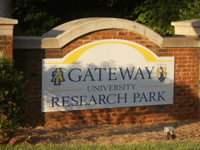 No
statuary NCGS:
116-198.34. (8b) NC
A&T/ UNCG Joint
Millennial Campus was designated Oct.
2003 enabling Greensboro Center
for Innovative Development, Inc.
to administer the
educational, research, and
economic development mission of
a Joint Millennial Campus. No
lawful leased was executed by
Board of Governors to the
Greensboro Center for Innovative
Development, Inc. for
Session Law 2003-284, Section
6.20, land and facilities and
75-acre parcel of NC A&T
Farmland No
statuary NCGS:
116-198.34. (8b) NC
A&T/ UNCG Joint
Millennial Campus was designated Oct.
2003 enabling Greensboro Center
for Innovative Development, Inc.
to administer the
educational, research, and
economic development mission of
a Joint Millennial Campus. No
lawful leased was executed by
Board of Governors to the
Greensboro Center for Innovative
Development, Inc. for
Session Law 2003-284, Section
6.20, land and facilities and
75-acre parcel of NC A&T
Farmland |
|
|
|
|
A Millennial Campus is Real Property
designated by UNC Board of Governors
pursuant NCGS116-198.34 (8b) which says in
part: Upon formal request by the constituent
institutions, the Board of Governors may
authorize two or more constituent
institutions which meets the requirements of
this section to create a joint Millennial
Campus. §
116-198.34. General Powers of Board of
Governors |
|
|
 Greensboro
City's Greensboro
Connections 2025 Comprehensive Plan was
adopted May
2003. A key principle of
the Comprehensive Plan is to promote
economic development in historically
under-served parts of the City such
as East Greensboro. Properties in
these areas should receive priority
consideration as the City designates
and promotes land for economic
development. The NCA&TSU Farm site
is one such candidate. 7D.3 Promote
economic development through
public/private partnerships to
include government, economic
development agencies, educational
and health care institutions, and
businesses. Build on existing
partnerships and initiatives in this
effort. Examples include: Greensboro
City's Greensboro
Connections 2025 Comprehensive Plan was
adopted May
2003. A key principle of
the Comprehensive Plan is to promote
economic development in historically
under-served parts of the City such
as East Greensboro. Properties in
these areas should receive priority
consideration as the City designates
and promotes land for economic
development. The NCA&TSU Farm site
is one such candidate. 7D.3 Promote
economic development through
public/private partnerships to
include government, economic
development agencies, educational
and health care institutions, and
businesses. Build on existing
partnerships and initiatives in this
effort. Examples include:
|
|
University-related research and
development opportunities with UNCG
and NCA&TSU (building on the
example of the Nussbaum Center
incubator facility)[ One of
their primary tasks will be keeping
tabs on research at the two
universities, in areas such as
engineering and sciences, that might
have commercial uses. They will look
for existing companies that could
benefit from that research and
explore the potential of using it to
create start-up businesses.]
Work with NCA&TSU to establish a
research park on the A&T farm
property, [NCA&T Farmland is located
in Guilford County not Greensboro
City |
|
|
|
|
Published as "the most
plugged-in attorney in North
Carolina", northcarolina.edu minutes
claim City
of Greensboro Lobbyist, Greensboro
Attorney Jim W. Phillips, Jr.,
Committee Budget and Finance
Chair speaking before Board of
Governors stated that the Boards
of Trustees at North Carolina
A&T State University and |
|
|
the University of
North Carolina at
Greensboro requested
that the land
formerly designated
for the Central
School for the Deaf
and allocated to the
Board of Governors
by the 2003 Session
of the General
Assembly and a 75 -
acre parcel of land
currently |
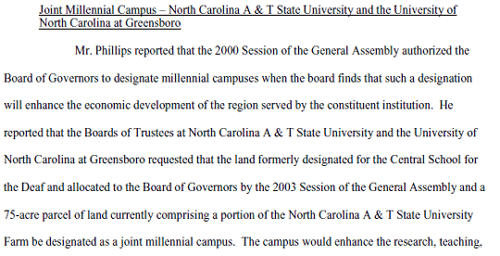 |
 comprising
a portion of the North Carolina
A&T State University Farm be
designated as a Joint Millennial
Campus, alleged approved Oct.
10, 2003, at Appalachian State. comprising
a portion of the North Carolina
A&T State University Farm be
designated as a Joint Millennial
Campus, alleged approved Oct.
10, 2003, at Appalachian State. |
|
|
“A Promise for
the Future By
some accounts,
nanotechnology
is destined to
replace much of
today's
technology.
Gateway
University
Research Park
expects to be at
the forefront of
these new
technologies
with the creation
of a new
institution,
The Joint School
for Nanoscience
and
Nanoengineering
(JSNN). ”
emphasis added
|
 Request
for
Proposals
by
Gateway
University
Research
Park
for
Construction
The
Joint
School
of
Nanoscience
and
Nanoengineering-
dated
Sept.
1,
2004 Request
for
Proposals
by
Gateway
University
Research
Park
for
Construction
The
Joint
School
of
Nanoscience
and
Nanoengineering-
dated
Sept.
1,
2004
Project
Overview: The
JSNN
will
support
established
research
programs
with
faculty from
the
two
universities
and
will
have
its
own
faculty
lines
as
well. The
primary
goal
of
the
school
is
to
be a
world
leader
in
research,
nano-related
education,
and
outreach.
The
JSNN
will
promote
Research
goals,
Education
goals,
and
Outreach
goals.
To
meet
these
goals,
the
JSNN
will
require
specialized,
state-of-the-art
industrial quality
research
space. These
will
include
laboratories
for
life
sciences,
engineering,
materials
science
and
other
spaces
requiring
tightly
controlled
environments. |
|
|
The constituent
university where
the
Project
will be
constructed:
|
Gateway University Research Park, South Campus
2900 East Lee Street Greensboro, NC 27401
|
|
Note: In
2003 Gateway
University
Research
Park didn't
exits. The
Greensboro
Center for
Innovative
Development
would change
its name in
2006 to
Gateway
University
Research
Park, Inc. |
| |
|
Note: SACS-COC
Policy
Statement: Separate
Accreditation
for extended
units of a
Member
institution.
For Units of
a Member
Institution
extended
unit to be
eligible for
accreditation
as a separate
institution it
must offer a
degree and
separate
from the
main campus.
Procedure
for an
Extended
Unit Seeking
Separate
Accreditation
(.1) Application
for
Membership,
including
all
documentation
required to
demonstrate
compliance
with Core
Requirements
2.1- 2.11,
[2.1 The
institution
has
degree-granting
authority
from the
appropriate
government
agency or
agencies.
(Degree-granting
Authority). |
| |
| Fast Forward to May 2007. |
| May 2007 UNC Board of Governors established alleged Joint School of Nanoscience and Nanoengineering, at bogus NC A&T / UNCG Joint Millennial Campus, UNCG Affiliate Gateway University Research Park, to offer (a) joint interdisciplinary Ph.D. degree and (a) joint professional science master's degree. |
 |
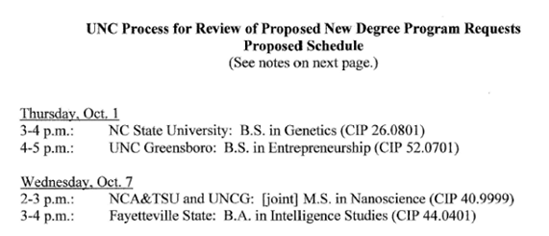 |
| Memorandum to Chief Academic Officers from Alan Mabe and Jim Sadler, Subject Restating the Academic program Planning and Evaluation Process dated September 21, 2009 proposed schedule for Wednesday, Oct. 7, 2009 included entry NCA&TSU and UNCG [joint] M.S. in Nanoscience CIP 40.999). |
| |
 |
| |
 |
| |
| Ala Mabe Memorandum dated March 18, 2010 to Members, Committee on Educational Planning, Policies and Programs, etc Subject Progress in Reviewing Degree Proposals indicated UNCG: [joint JSNN] M. S. in Nanoscience approved by BOG Nov. 2009], adding JSNN to the degree and excluding NC A&T. |
|
|
|
|
| Note: UNC joint degrees are between institutions and the Joint school of Nanoscience and Nanoengineering was established as a school, which did not prevent authorization of alleged UNCG/JSNN joint degree. |
| |
| Unambiguous Request for Proposals by Gateway University Research Park for Construction The Joint School of Nanoscience and Nanoengineering- dated Sept. 1, 2004 indicate intent to divest NC A&T of it Nanoscience assets, script In UNCG as it create a new/ de factor institution Gateway University Research Park, physically located at (NC A&T Farm) 2900 East Lee Street Greensboro, NC 27401. |
|
|
| |
|
Department
of
Education
maintains
a
list
of
“DOE-recognized”
institution-wide
accrediting
agencies;
for
an
institution
to
be
eligible
to
participate
in
Title
IV
Financial
Aid
Programs,
it
must
be
accredited
by
one
of
these
DOE-recognized
agencies. |
|
|
| Accreditation is either: |
- Institution-based (“institution-wide accreditation”)
- Academic Discipline-based (“academic program accreditation”)
|
|
|
UNC
Board
of
Governors
Policy
Discussion
Accreditation,
Dr.
Suzanne
Ortega,
November
7,
2013. |
|
| |
|
University
of Albany
at SUNY, Home
to the New
York State
Center of
Excellence
in
Nanoelectronics
and
Nanotechnology
(http://www.sunycnse.com/AboutUs/QuickFacts.aspx)
: |
|
|
|
|
|
Public
Record Reply from
UNC-Greensboro
for
statutory
required
request to
establish a
Joint
Millennial
Campus
produced
alleged
Chancellors
signed
Document
dated Aug.
22nd,
2003.
Alleged
Chancellors
signed
document
stated: "we
are pleased
to inform
you that
this
proposal has
been
approved by
both of our
Boards of
Trustees and
is supported
by local
community
leaders and
organizations
including
Action
Greensboro. |
| |
|
Recommended by
Chancellors Renick and
Sullivan, NC A&T and
UNC-G Board of 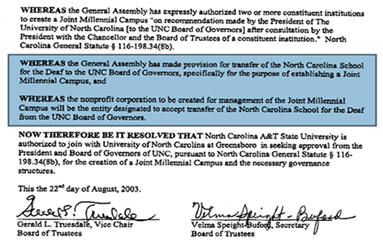 Trustees
duplicate Resolutions:
In Support of The
Creation of a Joint
Millennial Campus
between NC A&T and UNCG, dated Aug.
22, 2003, and Aug.
28, 2003 , called
for seeking designation
of Joint Millennial
Campus in terms of the
Central North Carolina
School of the Deaf real
estate, transferred to
UNC Board of Governors
for the purpose of
establishing a Joint
Millennial Campus.
Universities'
resolutions seek
designation of Joint
Millennial without a
syllable pertaining to
a 75-acre parcel of NCA&T
farmland, statutory
foreclosed Phillips
alleged NCA&T/UNCG Joint
Millennial Campus inclusive
of NC A&T Farmland. Trustees
duplicate Resolutions:
In Support of The
Creation of a Joint
Millennial Campus
between NC A&T and UNCG, dated Aug.
22, 2003, and Aug.
28, 2003 , called
for seeking designation
of Joint Millennial
Campus in terms of the
Central North Carolina
School of the Deaf real
estate, transferred to
UNC Board of Governors
for the purpose of
establishing a Joint
Millennial Campus.
Universities'
resolutions seek
designation of Joint
Millennial without a
syllable pertaining to
a 75-acre parcel of NCA&T
farmland, statutory
foreclosed Phillips
alleged NCA&T/UNCG Joint
Millennial Campus inclusive
of NC A&T Farmland. |
| |
|
NC A&T Resolutions:
In Support of The
Creation of a Joint
Millennial Campus maybe
Bogus |
| |
|
NC A&T: "As to
your prior request for
the resolution/motion
about the 75 acres of
land being a part of the
Gateway Research Park,
There is no 2003
resolution, etc. that
specifically says 75
acres are involved."
determined J. Charles
Waldrup J.D., Ph.D.
General Counsel Office
Of Legal Affairs North
Carolina Agricultural &
Technical State
University. |
|
| |
|
Millions of Taxpayer
dollars would flow
through UNC
Committee Budget and
Finance, approved by
full UNC Board of
Governors, and
funded by the
Legislature for
non-existing bogus NC
G. S.: 116-198.34.
(8b) NC. A&T/UNCG
Joint Millennial
Campus. |
| |
 |
 |
 |
The
Millennial
Campus
statue
required an
expressed
determination
universities
had the
fiscal  capacity
to
established
and maintain
the joint
millennial
Campus. Five
month after
the alleged
Oct. 2003
designation
Phillips'
Board of
Governors
Committee On
Budget and
Finance,
March 2004,
recommended
Supplemental
Expansion
Budget
Requests
2004-05, $4
million
dollars to
renovated
the School
of the Deaf
property,
and pay for
telephone
and high
speed
networking, [SL
2004 -124.] capacity
to
established
and maintain
the joint
millennial
Campus. Five
month after
the alleged
Oct. 2003
designation
Phillips'
Board of
Governors
Committee On
Budget and
Finance,
March 2004,
recommended
Supplemental
Expansion
Budget
Requests
2004-05, $4
million
dollars to
renovated
the School
of the Deaf
property,
and pay for
telephone
and high
speed
networking, [SL
2004 -124.] |
And
another $10
Million
dollars for
land
acquisition,
site
preparation,
and
engineering,  architectural
and other
consulting
services for
facilities
for
development
of the Joint
Millennial
Campus of
North
Carolina
Agricultural
and
Technical
State
University
and the
University
of North
Carolina at
Greensboro,
non-existing
Joint
Millennial
Campus.
[Session Law
2004-179] architectural
and other
consulting
services for
facilities
for
development
of the Joint
Millennial
Campus of
North
Carolina
Agricultural
and
Technical
State
University
and the
University
of North
Carolina at
Greensboro,
non-existing
Joint
Millennial
Campus.
[Session Law
2004-179] |
|
|
|
|
|
|
Proposed Lease was smoking Gun No
statuary NCGS:
116-198.34.(8b) NC
A&T/ UNCG Joint
Millennial Campus was designated Oct.
10, 2003 by
UNC Board of Governors for
Session Law 2003-284, Section 6.20, land and
facilities, and 75-acre parcel of NC A&T
Farmland. |
|
|
September 2004 NC A&T State
University celebrated the sighing of
Memorandum of Understanding
with 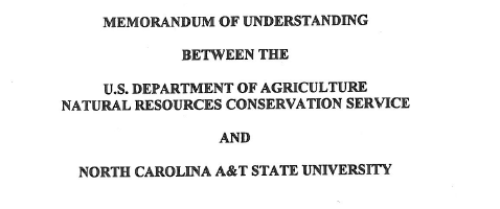 the
U.S. Department of Agriculture
(USDA) with the opening of the
National Resources Conservation
Services Eastern Regional Technology
Center whose service area consisted
of 24 states and the Caribbean area.
The Greensboro Center was also home
to the remote sensing lab. The
Memorandum of Understanding says A&T
has a working farm with modern
facilities and farm equipment. NRCS
will benefit from the use of this
farm by being able to provide
hands-on training to NRCS employees.
NRCS can sponsor field studies that
can serve as demonstrations to both
NRCS trainees and also local and
regional farmers. A&T constituents
will also benefit from this type of
applied investigation. Finally, A&T
faculty and students can also
benefit academically by conducting
scholarly research and publishing
this information. the
U.S. Department of Agriculture
(USDA) with the opening of the
National Resources Conservation
Services Eastern Regional Technology
Center whose service area consisted
of 24 states and the Caribbean area.
The Greensboro Center was also home
to the remote sensing lab. The
Memorandum of Understanding says A&T
has a working farm with modern
facilities and farm equipment. NRCS
will benefit from the use of this
farm by being able to provide
hands-on training to NRCS employees.
NRCS can sponsor field studies that
can serve as demonstrations to both
NRCS trainees and also local and
regional farmers. A&T constituents
will also benefit from this type of
applied investigation. Finally, A&T
faculty and students can also
benefit academically by conducting
scholarly research and publishing
this information. |
SFO NO. 5NC00&5 6/12/06, The General
Services Administration Desires to
Lease 24,732  Rentable
sq. ft. which will yield 21, 606
square feet of Office and related
space. in Greensboro, North
Carolina. Area of Consideration The
North Carolina A&T University
Campus, Greensboro, North Carolina.
Page 5,1.2 Offers due date July 6,
200 Rentable
sq. ft. which will yield 21, 606
square feet of Office and related
space. in Greensboro, North
Carolina. Area of Consideration The
North Carolina A&T University
Campus, Greensboro, North Carolina.
Page 5,1.2 Offers due date July 6,
200 |
|
|
|
|
|
|
|
Millennial Campus Statue] §
116-198.34. General powers of
Board of Governors.
The Board may exercise any one
or more of the following powers:
(1) To determine the location
and character of any project or
projects, and to acquire,
construct, and provide the same,
and to maintain, repair, and
operate, and to enter into
contracts for the management,
lease, use, or operation of all
or any portion of any project or
projects and any existing
facilities. |
| |


Notwithstanding
Erskine Bowles
General
Administration
submission of
Acquisition of Real
Property PO-1,
dated March
16, 2006, to
Department of
Administration,
State Property
Office for the
purpose to establish
Joint Millennial
Campus for NC A&T
and UNCG; claiming
this action has been
approved by NC A&T
and UNCG Board of
Trustees. |
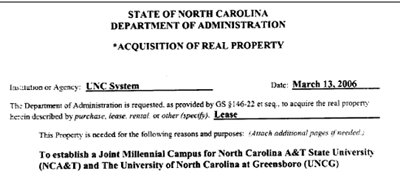 |
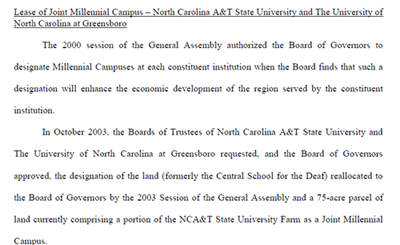 |
| |
|
The Bowles
Administration May
2006,
recommended approval
of UNC BOG document
Lease of Joint
Millennial Campus –
North Carolina A&T
State University and
The University of
North Carolina at
Greensboro,
containing known
false claim:
|
-
The Board of
Governors
approved, the
designation of
the land
(formerly the
Central School
for the Deaf)
reallocated to
the Board of
Governors by the
2003 Session of
the General
Assembly and a
75-acre parcel
of land
currently
comprising a
portion of the
NC A&T State
University Farm
as a Joint
Millennial
Campus,
-
Now, the Boards
of Trustees of
NC A&T and UNCG
are requesting
permission to
execute a ground
lease of the
land and
existing
improvements for
the Joint
Millennial
Campus to the
Greensboro
Center for
Innovative
Development, a
jointly-controlled
and
jointly-funded
501(c) (3)
entity that will
administer the
educational,
research, and
economic
development
mission of the
Joint
Millennial.
|
|
|
|
|
Kevin Holland, Contracting Officer GSA July
3, 2006 letter
to John Merrill.
Re: U.S. Department of Agriculture, natural
Resources Conservation Service (NRCS) Lease
Project, Greensboro , NC
This correspondence correspondence to your
June 30, 2006 inquiry concerning the status
of this project as a firm action that will
move forward. As I have advised on
numerous occasions and want to reiterate,
this particular project is an endeavor which
was approved by the U.S. General Services
Administration  as
a sole-source" procurement based upon the
unique requirements provided by the NRCS...As
such, we have been working and are committed
to diligently pursing satisfaction of NRCS
need for space
to be located on the campus of North
Carolina Agricultural & Technical State
University through
a negotiated lease procurement as
a sole-source" procurement based upon the
unique requirements provided by the NRCS...As
such, we have been working and are committed
to diligently pursing satisfaction of NRCS
need for space
to be located on the campus of North
Carolina Agricultural & Technical State
University through
a negotiated lease procurement |
|
|
|
|
|
|
|
 |
|
|
|
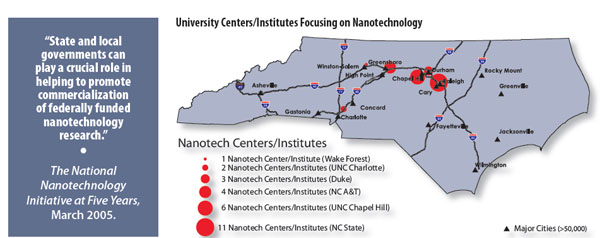
 Historical
Black Land Grant NC A&T was listed as
University focus on Nanotechnology May 2005. Historical
Black Land Grant NC A&T was listed as
University focus on Nanotechnology May 2005.
Cross town Historical White UNC
Greensboro was not listed as a University
focused on Nanotechnology. |
| |
|
|
The National Center for
Educational Statistics (NCES) responsible for collecting
and presenting statistical data and information for the
nation; classifies Nanoscience and Nanoengineering as
Nanotechnology CIP 15.1601: Engineering technologies and
Engineering related fields. |
 |
|
PCG/UNC-NCCCS/UNC Interim report
3.doc/RB.SP.PC.CR.ATPCC.1/CC.14/10May05 |
|
|
 |
|
University of North Carolina at Greensboro
2007-2008 Profile |
|
| Historical
black North Carolina A&T, as one of the
state's two land grant institutions, has
programs through the doctoral level. Its
programs include engineering, arts and
sciences, agricultural and environmental
sciences, business and economics, education,
nursing, technology, and graduates studies.
“The expected roles of a land-grant
institution, is teaching agriculture and
engineering, and providing cooperative
extension services” . |
| |
 |
|
For Liberal Arts UNC Greensboro with doctorial programs
in music and nursing to offer Nanoscience degrees
requires access to NC A&T academic programs and
research: “Although the degree is in Nanoscience (does
not include Nanoengineering),

students will be given the opportunity to take relevant
courses at the School of
Engineering at North Carolina A&T University and must be
able to work on collaborative projects with faculty in
the School of Engineering. |
|
Unlike land grant cross-town historical Black NC A&T
with strong programs in engineering offering Nanoscience
constituted a Substantive Change as defined by SACS from
previous approved circular at historical white women
UNCG with strong programs in liberal Arts. (UNCG)
Rebecca Adams to (SACS) Tom Benberg: Sarah Armstrong
Subject: Request for interpretation of accuracy of
nanoscience message, April 13, 2010:
The bottom line, however, is that we need to submit a
full prospectus and need to do so as soon as possible.
This request will be for approval to initiate a new
off-campus site (South Campus) and to initiate a new
degree program (MS in Nanoscience) at that site. Contrary
to previous interpretations, both represent substantive
changes.. Due to the confusion, they are willing to
waive the requirement that we do so 6 months in advance
and will usher it though the approval process in a
timely way so that we can accept students into UNCG's MS
in Nanoscience program next fall. |
|
|
 |
|
NC A&T/UNCG
submitted Joint Request for authorization to
Establish” Ph.D. in Nanoscience” dated Oct.
10, 2008 to UNC General Administration and
Joint Request for authorization to establish
“Master of Science (in Nanoscience)” dated
Nov. 21, 2008 to UNC General
Administration. |
|
Clearly
unnecessary duplication, when across-town Liberal Art
UNC Greensboro with programs in music and nursing,
requiring relevant courses be taken at the School of
Engineering at North Carolina A&T University and will be
able to work on collaborative projects with faculty in
the School of Engineering”, except for unvarnished
racism offering Nanotechnology degrees? |
United States v. Fordice, 505
U.S. 717 (1992) a United States
Supreme Court case that resulted in an eight
to one ruling that the eight public
universities in Mississippi had not
sufficiently integrated and that the state
must take affirmative action to change this
under the Equal Protection Clause and Title
VI. This is not
a legal setting but context comparison UNC
BOG & SOCS policies in light of the selected
text held in UNITED STATES v. FORDICE,
GOVERNOR OF MISSISSIPPI :
|
|
..If the State perpetuates policies and
practices traceable to its prior de jure
dual system that continue to have
segregative effects ...implicit in the
court’s finding of “unnecessary” duplication
is the absence of any educational
justification ....and such policies are
without sound educational justification and
can be practicably eliminated, implicated
the Equal Protection clause... , emphasis
added. |
| Notwithstanding UNC board of Governors May 2007
authorized JSNN to offer to offer NC A&T/UNCG joint
interdisciplinary Ph.D. degrees and joint professional
science master's degrees. |
|
 |
 The
University of North Carolina Board of Governors authorized HWI UNC Greensboro Nanoscience MS
and Gateway University Research Park, Inc. on
November 13, 2009 and PhD program in Nanoscience on
January 8, 2010 to UNCG requiring UNCG students take relevant
courses at the School of Engineering at North Carolina
A&T University and be able to work on collaborative
projects with faculty in the School of Engineering”.
Excluding
(The) North Carolina Agricultural and Technical State
university from offering MS and PhD Nanoscience
degrees, forcing the HBCU out of the JSNN Mission to
offer (a)
joint interdisciplinary Ph.D. degree and (a) joint
professional science master's degree. And depriving NC
A&T benefit Nanoscience funding. The
University of North Carolina Board of Governors authorized HWI UNC Greensboro Nanoscience MS
and Gateway University Research Park, Inc. on
November 13, 2009 and PhD program in Nanoscience on
January 8, 2010 to UNCG requiring UNCG students take relevant
courses at the School of Engineering at North Carolina
A&T University and be able to work on collaborative
projects with faculty in the School of Engineering”.
Excluding
(The) North Carolina Agricultural and Technical State
university from offering MS and PhD Nanoscience
degrees, forcing the HBCU out of the JSNN Mission to
offer (a)
joint interdisciplinary Ph.D. degree and (a) joint
professional science master's degree. And depriving NC
A&T benefit Nanoscience funding. |
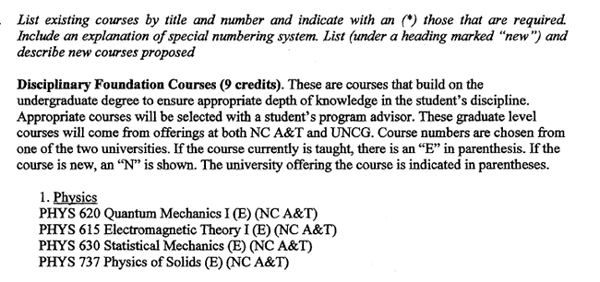 |
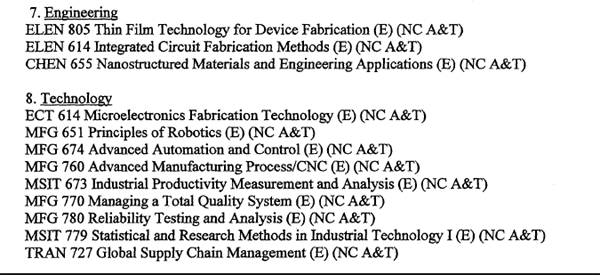 |
|
Unambiguous UNC Board of
Governors /UNC General
Administration exploited HBCU NC
A&T Engineering circular and
research to establish
Nanoscience MS and Ph.D. at
cross-town white UNC Greensboro. |
|
|
UNC Board of
Governors Minutes May
2006 |
|
|
|
|
| The North Carolina A&T State
University and the UNC Greensboro Joint
School of Nanoscience and Nanoengineering.
Dr. Priscilla P. Taylor (Cemala
Foundation) reported that the Greensboro
and greater Triad community are solidly
behind this proposal and see it as an
important step that will have significant
impact on economic development in the
region. The master's and doctoral degree
programs will follow the ordinary approval
process and will be separately considered by
the committee |
|
|
|
|
Examining Nanoscience
discipline file at www.northcarolina.edu : |
 |
 |
|
1. The
discipline file contained no UNCG
Notification to plan a master’s in
Nanoscience,
2. The
discipline file contained an unsigned “Revised
UNCG Request to Establish a Master’s in
Nanoscience,
3. The
discipline file contained no UNCG Request to
plan a PhD in Nanoscience
4. The
discipline file contained no UNCG Request to
Established a PhD in Nanoscience |
|
|
|
|
 |
 |
|
Chancellor signature certifies proposal [UNC Policy
Manual 400.1.5(G)] to establish new degree program was
reviewed and approved by the appropriate campus
committees and authorities. |
|
Responding to a Public records request to Dr. David H.
Perrin UNCG Provost & Executive Vice Chancellor,1/7/11,
for a copy of an UNCG chancellor signed request to
establish stand alone Masters and PhD Nanoscience
degrees at UNCG, Counsel Steve Serck responded "In
response to your request of 1/7/11, no such documents as
you described exists." |
|
Unambiguous
lack of UNCG Chancellor
Dr. Linda Brady signed Proposals requesting to
establish Nanoscience Professional Master of Science in
Nanoscience and Ph.D. Nanoscience clearly demonstrated
UNCG had not expressed intentions to establish
the degrees, they had not been approved by the faculty
and administration, and were not pursuant UNC Policies 400.1.1,1[G]and
400.1.1.5[G], and did not officially originate from UNC
Greensboro. |
|
|
 |
|
A degree program is a
program of study in a discipline specialty
that leads to a degree in that distinct
specialty area at a particular level of
instruction. As a general rule, in order
to be considered for degree program status,
a course of study should require at least 27
semester hours in the proposed program area
at the undergraduate level; at least half
the number of hours required for the degree
at the master’s level; and at least 21 hours
in the proposed program area at the doctoral
level. [Adopted
05/06/09] |
|
|
Notwithstanding the
National Center for
Educational
Statistics (NCES),
categorized
Nanoscience as CIP
15.1601 Engineering
Technologies and
Engineering-Related
Fields. UNC
General
Administration
applied CIP
40.9999 (Physical
Science) to UNCG
academic offering . Note
UNC-G has a School
of Arts and
Science. |
 |
|
| Note Fall
2005 UNC Presidency transition
from President
Molly Broad to
Erskine Bowles. |
|
Professional Master of Science
in Nanoscience
The 33-hour, non-thesis MS in
Nanoscience follows the
Professional Master of Science
degree model, featuring course
work in Nanoscience and business
and an internship to provide
practical experience. |
| |
 |
UNC General
Administration applied CIP
40.9999 (Physical
Science) to UNCG
academic offering determined
UNC at Greensboro offered
only a Master in
Chemistry on the
graduate level in the
category of Physical
Science. |
| |
|
Unambiguous a degree in
Chemistry is not a
degree in Nanoscience.
UNC Greensboro academic
inventory was
substantially below the
general rule of at
least half the number of
hours required for
discipline
[Nanoscience] degree at
the master’s level. |
|
|
|
Doctor of Philosophy in Nanoscience
The PhD in Nanoscience requires a minimum of
60 hours and is designed to prepare students
to take positions in industrial,
governmental, or academic research settings
by providing a solid background in
Nanoscience theory and experimental
techniques through course work and
dissertation research. |
| |
|
 |
The PhD program will include a core
interdisciplinary curriculum that provides a
thorough background in the principles and
tools required for a research career in
nanoscience. |
| |
 ”The
addition of
a doctoral
program is
not an easy
or simple
extension of
the master’s
program.
Unlike most
master’s
programs, a
doctoral
program is
research-based.
While
doctoral
program
requirements
routinely
include
additional
course work,
the central
program
requirement
is the
dissertation.
The topic
for the
dissertation
normally
derives from
discussion
with faculty
who are
engaged in
research and
therefore
knowledgeable
about the
“frontier of
knowledge”
in the
discipline.
For a
faculty
member to
then
properly
guide and
assist the
student’s
dissertation
research,
that faculty
member must
be an active
researcher.
Hence, the
implementation
of a
doctoral
program must
be preceded
by the
assembling
of faculty
who are
conducting
publishable
research in
that
discipline.
UNIVERSITY
OF NORTH
CAROLINA
PROGRAM
DUPLICATION
STUDY
Submitted by
James H.
Woodward
November 1,
2011 p12] ”The
addition of
a doctoral
program is
not an easy
or simple
extension of
the master’s
program.
Unlike most
master’s
programs, a
doctoral
program is
research-based.
While
doctoral
program
requirements
routinely
include
additional
course work,
the central
program
requirement
is the
dissertation.
The topic
for the
dissertation
normally
derives from
discussion
with faculty
who are
engaged in
research and
therefore
knowledgeable
about the
“frontier of
knowledge”
in the
discipline.
For a
faculty
member to
then
properly
guide and
assist the
student’s
dissertation
research,
that faculty
member must
be an active
researcher.
Hence, the
implementation
of a
doctoral
program must
be preceded
by the
assembling
of faculty
who are
conducting
publishable
research in
that
discipline.
UNIVERSITY
OF NORTH
CAROLINA
PROGRAM
DUPLICATION
STUDY
Submitted by
James H.
Woodward
November 1,
2011 p12]
|
| |
|
NCA&T was
4th in
Funding in
Nanotechnology
Research at
North
Carolina
Universities
with $11
Million
Dollars
between
2000-2005.
UNC at
Greensboro
10th among
the 11
institutions
conducted
$45,000
dollars of
Nanotechnology
research
between 2000
thru 2005.
|
|
|
|
|
Erskine Bowles UNC
General Administration categorizing
Nanoscience Ph.D. as a Physical
Science; examining UNC Greensboro
curricula for similar Physical
Science Ph.D. programs
determined: |
 |
UNC
Greensboro offer no
similar Ph.D.
programs.
|
| |
|
Clearly UNC Board
of Governors and UNC
General
Administration
exploited HBCU NC
A&T
Engineering circular
and research to
establish
Nanoscience MS and
Ph.D. at cross-town
white UNC
Greensboro. |
|
|
|
|
|
Requests to UNC-GA for a UNCG Request to
Plan a PhD and Request to Establish a
standalone PhD in Nanoscience proscribed by
UNC Guidelines for Academic Program
Development subsection (B) related to
degree authorization Ms. Joni Worthington
(UNC-GA) Vice President for Communications
UNC General Administration responded to a
public record request for a UNCG Chancellor
signed request to plan and establish a PhD
in Nanoscience said: “Dr. Alan Mabe in
his capacity as Senior Vice President for
Academic Affairs determined:
· UNCG
was not required to submit a new request to
plan a Ph.D. in Nanoscience. The joint
proposal submitted by UNCG and NCA&T was
deemed sufficient for the campus to move
forward with planning a stand-alone degree
program.
· UNCG
was not required to submit a new request to
establish a Ph.D. in Nanoscience. The joint
request submitted by UNCG and NCA&T, which
had already been recommended for approval by
the UNC Graduate Council, was deemed
sufficient for Board consideration. The
Board of Governors
concurred with that determination in
approving the establishment of the program.
(E-mail 10.08. 2010) “ |
| |
|
The
President [shall] promulgate
regulations to implement Board of
Governors Policy.
|
|
 |
|
Policy on Academic Program Planning
The UNC Policy Manual 400.1 Adopted |
|
Contradicting
assertions Dr. Mabe in the capacity of
Senior VP for Academic Affairs etc., are
Board approved Guidelines for Academic
Program Development subsection (B.)
Academic Program Development Requiring
Authorization or Action Beyond the Campus
Level, which says The chancellors of the
constituent institutions shall communicate
to General Administration of the University
their intentions or requests with respect to
instructional program development for
Request for authorization to plan a new
degree program at the doctoral or first
professional level and Request for
authorization to establish a new degree
program. [Guidelines for Academic Program
Development [The UNC Policy Manual
400.1.1.1[G] Adopted 05/06/09 |
| |
|
|
|
|
Early in the investigation of
lack of supporting documentation
for UNCG Nanoscience degree
authorizations Dr. James Sadler
Associate Vice President for
Academic Planning University of
North Carolina put forth a
chronology of authorizations
(e-mail (08/04/2010). |
| |
May 11, 2007
Board of Governors authorizes
establishment of the Joint
School of Nanoscience and
Nanoengineering. You
ask about any request to amend
the Joint School, but I am not
aware of any request, emphasis
added. |
| |
|
Dr. Sadler Chronology
acknowledged unsigned alleged
“Revised UNCG Request to
Establish a Master’s in
Nanoscience dated Nov. 9, 2009
was JSNN Dean Jim Ryan; |
|
| |
|
From: James C. Sadler <
>
Date: Sun, Oct 11, 2009 at 10:07 AM
Subject: Re: Revised version of the Request
to Establish the Professional Master of
Science in Nanoscience degree program
To: James Ryan <j>
Cc: dhprrin@uncg.edu,
James C Petersen JCPETERS < >, altont@ncat.edu, kmurray@ncat.edu
Thanks, Jim. I'll confer with Alan about the
Ph.D. and whether anything is needed. Jim
Sadler
James Ryan wrote:
Jim,
I have attached a revised version of the
Request to Establish for the Professional
Master of Science in Nanoscience. I have
included the most recent update of the JSNN
Management Agreement as well as revised
figures on enrollment. I have also provided
additional explanation to address questions
that were asked during the disciplinary
committee review on Wednesday. Please review
and let me know if additional information or
clarification is needed.
Also, similar revisions are needed for the
Request to Establish the Ph.D. in
Nanoscience. Should I send the latest
version of that document to you as well?
Thank you.
Jim
James C. Sadler, Ph.D.
Associate Vice President, Academic Planning
Interim Assoc. VP, Institutional Research &
Analysis UNC General Administration |
| |
November 13, 2009
UNC Board of Governors
authorizes the UNCG MS in
Nanoscience based on the revised
request submitted. The summary
that went to the Board can be
viewed in the Planning Committee
pre-meeting materials at this
location: https://www.northcarolina.edu/bog/index.php. |
 |
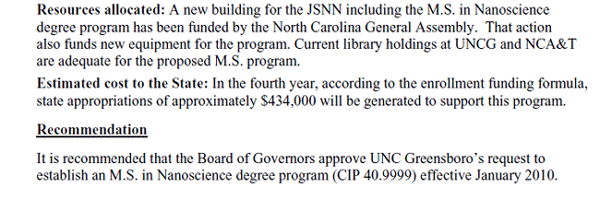 |
 |
|
|
May 2007 UNC
Board of
Governors
established
alleged
Joint School
of
Nanoscience
and
Nanoengineering,
at bogus NC
A&T / UNCG
Joint
Millennial
Campus, UNCG
Affiliate
Gateway
University
Research
Park, to
offer (a)
joint
interdisciplinary
Ph.D. degree
and (a)
joint
professional
science
master's
degree. |
 |
|
Memorandum
to Chief
Academic
Officers
from Alan
Mabe and Jim
Sadler,
Subject
Restating
the Academic
program
Planning and
Evaluation
Process
dated
September
21, 2009
proposed
schedule for
Wednesday,
Oct. 7, 2009
included
entry NCA&TSU
and UNCG
[joint] M.S.
in
Nanoscience
CIP 40.999). |
| |
 |
| |
|
|
Ala Mabe Memorandum
dated March 18, 2010
to Members,
Committee on
Educational
Planning, Policies
and Programs, etc
Subject Progress in
Reviewing Degree
Proposals indicated
UNCG: [joint JSNN]
M. S. in Nanoscience
approved by BOG Nov.
2009], adding JSNN
to the degree and
excluding NCA&T. |
|
|
|
|
| |
January 8, 2010
UNC Board of Governors authorizes the UNCG
PhD in Nanoscience based on the revised
request submitted. The summary that went to
the Board can be viewed in the Planning
Committee pre-meeting materials at this
location: https://www.northcarolina.edu/bog/index.php. |
|
|
| |
|
Alleged, NC A&T Dr.
Alton Thompson, Interim
Provost and Vice
Chancellor for Academic
Affairs and UNCG Dr.
David H. Perrin, Provost
and Vice Chancellor for
Academic Affairs, in
letter dated August
5, 2009 to Dr. Belle
Wheelan said this letter
is in response to your
letter dated March 17,
2009. |
| |
 |
|
3.
Principles
of
Accreditation,
Comprehensive
Standard
3.4.6 |
| |
|
Principles
Relevant to
All Joint
Curricular
Ventures
(3.), The
Joint school
of
Nanoscience
and
Nanoengineering
(JSNN) has
been formed
as a joint
venture of
two
regionally
accredited
institutions.
The General
Administration
of the
University
of North
Carolina
system
approved the
formation of
the
school. The
amended and
restated
JSNN
management
agreement is
attached to
this
document
(Appendix
1). |
| |
|
When
approval is
received
from the UNC
System, the
faculty
approval of
the degree
programs and
courses will
then follow
the
procedures
outlined in
the faculty
handbooks at
the
respective
campus clear
indicate the
General
Administration
of the
University
of North
Carolina
system JSNN
was not
approved by
UNC System /
Board of
Governors. |
|
|
| |
|
Memorandum to Chief Academic
Officers from Alan Mabe and
Jim Sadler, Subject
Restating the Academic
program Planning and
Evaluation Process dated
September 21, 2009 proposed
schedule for Wednesday, Oct.
7, 2009 included entry NCA&TSU
and UNCG [joint] M.S. in
Nanoscience CIP 40.999). |
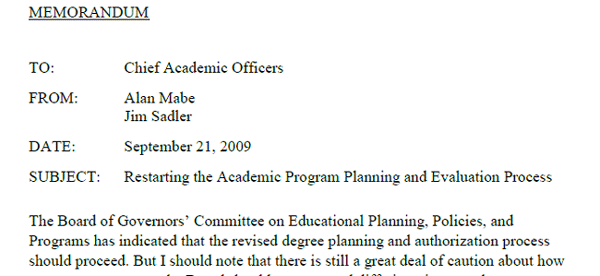 |
| |
| |
|
 |
| |
| Unambiguous Alan Mabe
and Jim Sadler Memorandum
revised degree planning and
authorization should
continue, NC A&TSU and UNCG
(joint) M.S. in Nanoscience
Wednesday Oct. 7, was
evidence August 5, 2009
letter to Dr. Wheelan
allege approaches and
protocols (Appendix I) were
not amended and restated to
conform to the new policies
of the University of North
Carolina System. (Appendix
I). |
|
| |
May 11, 2007
Board of Governors authorizes
establishment of the Joint School of
Nanoscience and Nanoengineering. You
ask about any request to amend the
Joint School, but I am not aware of
any request, emphasis added. |
|
| |
|
NC A&T
Chancellor Martin, UNC System General
Administration staff , JSNN Dean Ryan, and
Alan Mabe Vice President for Academic
Affairs, and members of Greensboro
Businesses who were also members of the
Board of Governors used their position in
the authorization process to implemented the
General Administration approved JSNN. NC A&T
will offer Nanoengineering degrees and UNC
Greensboro will offer Nanoscience
degrees; Not UNC Board of Governor May 2007
approved JSNN, to offer (a) joint
interdisciplinary Ph.D. degree and (a) joint
professional science master's degree. |
| |
The degree authorization process progression
calls for a constituent institutions to
submit Request to Establish a New Degree to
UNC System General Administration which
serves under the

President. The General Administration
submits constituents request
to Planning Committee. If the Planning
Committee approved the Request it is taken
to the full Board of Governors for a
decision to authorized. With Harold Martin
as Chancellor of NC A&T , Alan Mabe Senior
Vice President for Academic Affairs, Dr.
Taylor associated with the Cemala Foundation
a member of the Greensboro Partnership, on
the Ed Planning Committee.

JSNN Dean Ryan without authority
to submit degree proposals to UNC General
Administration, formulated Nanoscience
degrees for HWI UNC Greensboro, excluding
HBCU NC A&T. Members of the UNC General
Administration and
Senior Vice President Alan Mabe use
authority to manage the review process, to
implement General Administration Approve
JSNN and Amended and Restated Management
Agreement Circular/degrees UNC Greensboro
will offer Nanoscience degrees in stead of
the Board of Governors May 2007 approved
JSNN in which Nanoscience were joint
degrees. |
| |
|
{1]Nanobiotechnology Center of
Innovation North Carolina
Biotechnology Center 20/11/2007 |
| {2] Jack
Scism TRIAD
SCIENTIFIC RESEARCH CENTER: VIABLE
DREAM OR PIE IN THE SKY? , JACK
SCISM, Greensboro News & Record -
Monday, July 20, 1992 . (emphasis
added |
|
[3] Request to Establish NCA&T/UNCG
Joint School of Nanoscience and
Nanoengineering March 5, 2007 |
| [4] (Jonnelle
Davis (Nano, money No.1 on A&T,
UNC-G list News & Record 10.04.2010) |
| [5] UNC-G,
A&T to seek $65M for nanotech
school, Matt Evans The Business
Journal Serving the Greater Triad
Area, Nov 13, 2006 |
| [6] Jonnelle Davis (Nano, money
No.1 on A&T, UNC-G list News &
Record 10.04.2010 |
| [7] [Ken
Mayer, Editorial, UNCG, A&T
University will need to be leaders
in the charge for high-tech industry
in the Triad, Triad Business Journal
Nov 9, 1998] ( Ken Mayer is former
Chairman UNCG BOT 2003-2004 &
2004-2005 |
| |
| [9]
UNCG and NC A&T
partner to create joint program in
nanotechnology, Sharlini Sankaran,
October 8, 2007, North Carolina
Board of Science and Technology,
http://www.ncnanotechnology.com/public/features/UNCG-NCAT.asp |
| [10]
] High Research
Activity The Scientist http://www.the-scientist.com/2007/03/01/s31/1/ |
| [11] |
| 12
[PCG/UNC-NCCS/UNC
Interim report3. doc/RB.SP.PC.CR.Atpcc.I
/CC.14/10May05 page 109] |
|
| |
|
|
|
 Throw
in with the devil get thrown in with the devil
Throw
in with the devil get thrown in with the devil “It
[JSNN] will be one of the most stimulating opportunities
in the history of the area and will serve as a national
model for collaboration between two institutions, one a
historical black institution and the other a historical
white female institution.” [3] The
Joint School of Nanoscience and Nanoengineering will be
a unique, interdisciplinary school, located at the South
Campus of the Gateway University Research Park, the
joint millennial campus of NC A&T and UNCG'
[3]...“The building would include
the academic departments, laboratory facilities
(teaching and research), and centers and institutes of
the new School as well as selected centers and
institutes currently located at the partner
universities. [3]Emphasis added
“It
[JSNN] will be one of the most stimulating opportunities
in the history of the area and will serve as a national
model for collaboration between two institutions, one a
historical black institution and the other a historical
white female institution.” [3] The
Joint School of Nanoscience and Nanoengineering will be
a unique, interdisciplinary school, located at the South
Campus of the Gateway University Research Park, the
joint millennial campus of NC A&T and UNCG'
[3]...“The building would include
the academic departments, laboratory facilities
(teaching and research), and centers and institutes of
the new School as well as selected centers and
institutes currently located at the partner
universities. [3]Emphasis added
 The
University of North Carolina Board of Governors authorized HWI UNC Greensboro Nanoscience MS
and Gateway University Research Park, Inc. on
November 13, 2009 and PhD program in Nanoscience on
January 8, 2010 to UNCG requiring UNCG students take relevant
courses at the School of Engineering at North Carolina
A&T University and be able to work on collaborative
projects with faculty in the School of Engineering”.
Excluding
(The) North Carolina Agricultural and Technical State
university from offering MS and PhD Nanoscience
degrees, forcing the HBCU out of the JSNN Mission to
offer (a)
joint interdisciplinary Ph.D. degree and (a) joint
professional science master's degree. And depriving NC
A&T benefit Nanoscience funding.
The
University of North Carolina Board of Governors authorized HWI UNC Greensboro Nanoscience MS
and Gateway University Research Park, Inc. on
November 13, 2009 and PhD program in Nanoscience on
January 8, 2010 to UNCG requiring UNCG students take relevant
courses at the School of Engineering at North Carolina
A&T University and be able to work on collaborative
projects with faculty in the School of Engineering”.
Excluding
(The) North Carolina Agricultural and Technical State
university from offering MS and PhD Nanoscience
degrees, forcing the HBCU out of the JSNN Mission to
offer (a)
joint interdisciplinary Ph.D. degree and (a) joint
professional science master's degree. And depriving NC
A&T benefit Nanoscience funding.














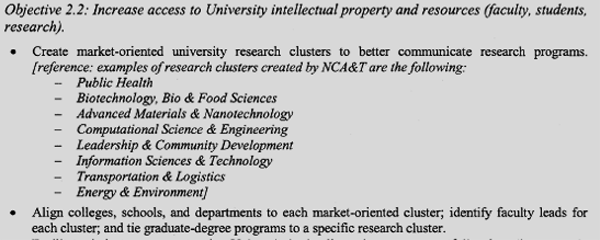

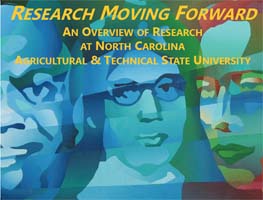









 Reported
in the Media: "UNCG/A&T
proposal had won the
enthusiastic endorsement of
top
Reported
in the Media: "UNCG/A&T
proposal had won the
enthusiastic endorsement of
top 


 Bowles
appointee Interim NC A&T
Chancellor Lloyd V. Hackley
and UNCG Chancellor made the
Request to Establish The
JSNN March 7, 2007.
Bowles
appointee Interim NC A&T
Chancellor Lloyd V. Hackley
and UNCG Chancellor made the
Request to Establish The
JSNN March 7, 2007.


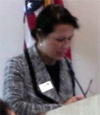







 Dr.
James
Ryan, JSNN
Founding
Dean was
hired
away
from
School
of
Nanosciences
and
Nanoengineering
at the
University
at
Albany.
Dr.
James
Ryan, JSNN
Founding
Dean was
hired
away
from
School
of
Nanosciences
and
Nanoengineering
at the
University
at
Albany.




 capacity
to
established
and maintain
the joint
millennial
Campus. Five
month after
the alleged
Oct. 2003
designation
Phillips'
Board of
Governors
Committee On
Budget and
Finance,
March 2004,
recommended
Supplemental
Expansion
Budget
Requests
2004-05, $4
million
dollars to
renovated
the School
of the Deaf
property,
and pay for
telephone
and high
speed
networking, [SL
2004 -124.]
capacity
to
established
and maintain
the joint
millennial
Campus. Five
month after
the alleged
Oct. 2003
designation
Phillips'
Board of
Governors
Committee On
Budget and
Finance,
March 2004,
recommended
Supplemental
Expansion
Budget
Requests
2004-05, $4
million
dollars to
renovated
the School
of the Deaf
property,
and pay for
telephone
and high
speed
networking, [SL
2004 -124.] architectural
and other
consulting
services for
facilities
for
development
of the Joint
Millennial
Campus of
North
Carolina
Agricultural
and
Technical
State
University
and the
University
of North
Carolina at
Greensboro,
non-existing
Joint
Millennial
Campus.
[Session Law
2004-179]
architectural
and other
consulting
services for
facilities
for
development
of the Joint
Millennial
Campus of
North
Carolina
Agricultural
and
Technical
State
University
and the
University
of North
Carolina at
Greensboro,
non-existing
Joint
Millennial
Campus.
[Session Law
2004-179] the
U.S. Department of Agriculture
(USDA) with the opening of the
National Resources Conservation
Services Eastern Regional Technology
Center whose service area consisted
of 24 states and the Caribbean area.
The Greensboro Center was also home
to the remote sensing lab. The
Memorandum of Understanding says A&T
has a working farm with modern
facilities and farm equipment. NRCS
will benefit from the use of this
farm by being able to provide
hands-on training to NRCS employees.
NRCS can sponsor field studies that
can serve as demonstrations to both
NRCS trainees and also local and
regional farmers. A&T constituents
will also benefit from this type of
applied investigation. Finally, A&T
faculty and students can also
benefit academically by conducting
scholarly research and publishing
this information.
the
U.S. Department of Agriculture
(USDA) with the opening of the
National Resources Conservation
Services Eastern Regional Technology
Center whose service area consisted
of 24 states and the Caribbean area.
The Greensboro Center was also home
to the remote sensing lab. The
Memorandum of Understanding says A&T
has a working farm with modern
facilities and farm equipment. NRCS
will benefit from the use of this
farm by being able to provide
hands-on training to NRCS employees.
NRCS can sponsor field studies that
can serve as demonstrations to both
NRCS trainees and also local and
regional farmers. A&T constituents
will also benefit from this type of
applied investigation. Finally, A&T
faculty and students can also
benefit academically by conducting
scholarly research and publishing
this information. Rentable
sq. ft. which will yield 21, 606
square feet of Office and related
space. in Greensboro, North
Carolina. Area of Consideration The
North Carolina A&T University
Campus, Greensboro, North Carolina.
Page 5,1.2 Offers due date July 6,
200
Rentable
sq. ft. which will yield 21, 606
square feet of Office and related
space. in Greensboro, North
Carolina. Area of Consideration The
North Carolina A&T University
Campus, Greensboro, North Carolina.
Page 5,1.2 Offers due date July 6,
200



